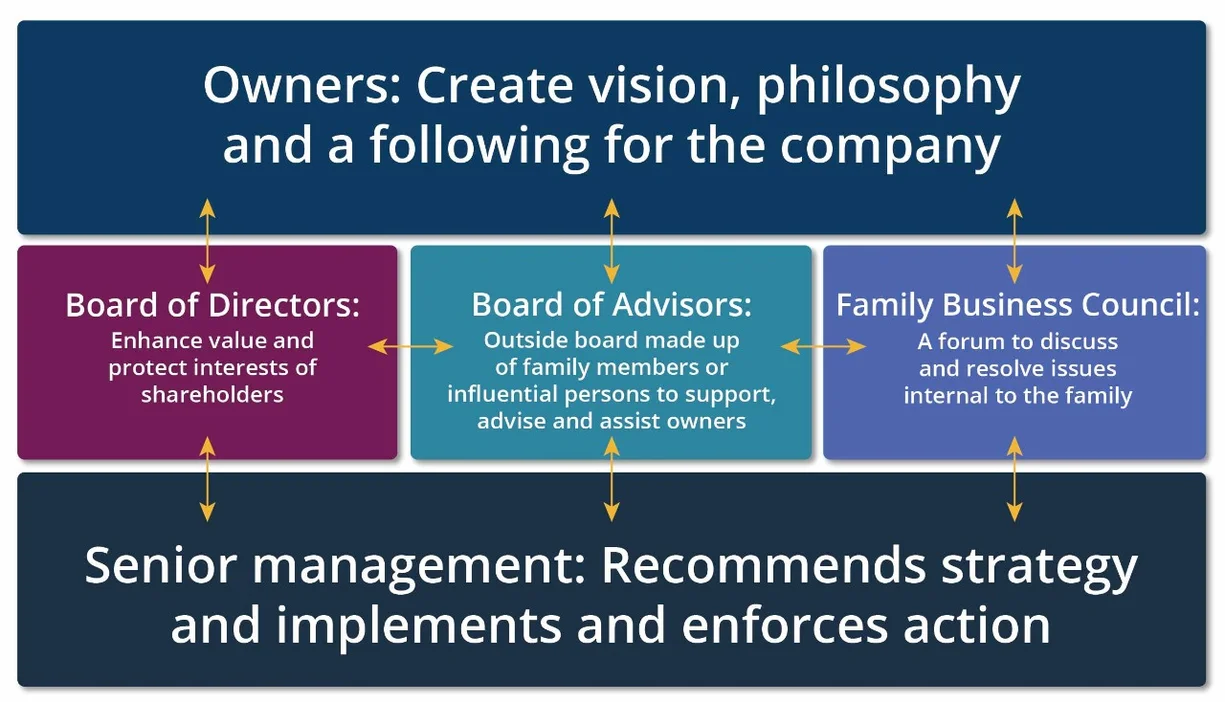Digital banking for business
Seamlessly access all of your accounts from one place with First Citizens Digital Banking for business.

Invest how you want, when you want, in real time with Self-Directed Investing.

Seamlessly access all of your accounts from one place with First Citizens Digital Banking for business.
We're committed to serving companies as they expand and succeed. The proof is in our success stories.
November Market Update video: Available now
Phillip and Blake take a deep dive into key issues for markets and the economy as we enter the holiday season.

Nerre Shuriah
JD, LLM, CM&AA, CBEC® | Senior Director of Wealth Planning and Knowledge
Generational succession planning for any family business can be particularly challenging. There are many issues that can derail the duration of a family-controlled company, including philosophical differences about the direction and growth of the company, ill-defined roles and responsibilities or the lack of a pathway out of the arrangement for a departing member. The good news is that with some forethought and planning, a legacy company that continues to thrive is possible.

First Citizens Bank, by way of example, is celebrating 125 years of business under third-generation leadership. The company is now the largest family-controlled bank in the United States, with a unique legacy of stability and long-term thinking that has helped personal, business, commercial and wealth clients build lasting financial strength.
Planning for a prosperous generational transition involves many steps, but there are three critical milestones owners should consider to achieve intended outcomes.
When a second generation of adult family members is seeking to take over a company, deep consideration should be given to how that company will be transferred to those seeking to assume leadership. Let's consider an owner, Charles, with three adult children.
Given this situation, what would be the outcome of an equal transfer? What if another option was more appropriate? Consider the following scenarios.
As owner, Charles wants to give a 1/3 interest in his company to each child. This is often the distribution parents default to as a way to treat their children equitably. But it's important to point out that equal in dollar amount isn't necessarily fair. An even distribution doesn’t consider Liz's years of hard work in the business or her seniority. It also doesn't consider that both Liz and Sam will have to work to make their inheritance pay off, while Keith can get the same payout as a passive owner.
What if Keith begins to rely on this income to pay a mortgage or other obligation, but Liz and Sam don't make distributions from the company to grow or expand? Keith wouldn't have a voice in this outcome, but it would likely affect their sibling relationship.
Charles may consider an alternative solution that separates the distribution according to involvement by transferring interests in the company to Liz and Sam. There are numerous wealth transfer techniques that could be used to accomplish this, including a grantor retained annuity trust. Transferring some or all the company interest through a compensation package to Liz and Sam allows their ownership amount to reflect their merit and seniority within the company as well, enabling Charles to give each child uneven amounts to compensate each for their own work to build the company.
Keith's inheritance can then be either a life insurance death benefit or annuity structured to supplement his income. The separation of his inheritance from the running of the company allows the siblings to keep business out of their familial relationship, especially when one of them isn't involved in the business.
Business owners have great decision-making power. They control long-term goals like the vision and growth of the company, as well as short-term goals like hiring and operating hours. Sometimes these decisions will need to be made quickly without all the needed information—or under stressful situations like the recent pandemic.
Sole owners, married owners or partners who built a business together often have a long relationship and cadence of communication that allows them to navigate and make such crucial decisions easily. However, as a business is transferred to successive generations these decisions must be made among more people, who often don't have the same level of closeness and parity as a long-married couple. Conflicts and disagreements will inevitably arise. An owner who has built a family governance structure to resolve conflict and help govern the company before a transfer can help ensure discord won't derail the train.
Family governance is a disciplined, open communication process that helps families recognize their own dynamics and manage competing interests within the family. It also allows the family unit to gain and strive toward a collective vision. Ratifying the governance system should be accomplished via voluntary buy-in and consideration of all inputs, even if some haven't been directly included.
With multiple owners, informal decisions are impractical. A governance structure helps to handle issues a family may want to avoid and promotes professionalism and candor among family members. It's vital during a crisis and can be a safe forum for airing and resolving disputes.
Some examples of family governance structures include:

This type of support structure can help create an appropriate forum for discussion and allow for alignment of goals and priorities. It also helps prevent miscommunication and over-dominance between owners and senior management, and keeps business decisions outside of familial relationships.
As the ownership transition begins, each family reaches the awkward crossover point where parents must relinquish control to adult children. While this may feel like an obvious point in the process, not everyone acknowledges it—and their emotions can often get in the way of passing the baton.
In this crucial phase, parents often feel like they're being fired—which can trigger feelings of being unmoored or unnecessary to the company they built and identify with personally. Meanwhile, adult children can feel micromanaged and not allowed to take the company forward with their own vision.
There are two critical steps of the business succession process that an owner must do to keep this process moving as smoothly as possible.
This means having a plan for their days rather than a vague idea of playing golf or seeing grandkids. Most people have a short period of unstructured time where they regroup, but they should then start to build activities into daily life that keep their minds and bodies active.
Examples include volunteering, serving on boards, teaching, working part-time or turning a hobby into a business. Without a clear plan for post-ownership, many owners come to regret the sale or transition of their business, which can lead to feelings of isolation and even depression.
Owner parents and their adult children should set up a timetable that outlines the skills the next generation must acquire while allowing parents to start phasing out. This will allow each party to hold the other to the agreement.
Once adult children exhibit the ability to take on decision-making roles for the business, the parents then will relinquish it. If both parties agree, parents can continue to work in the business as consultants or transition out of the business entirely.
In the end, successfully transitioning a family business from one generation to the next takes smart planning and open lines of communication.
Need a plan for the future of your business? We can put our 125 years of experience and legacy of long-term thinking to work for you. Contact a First Citizens Wealth Consultant and ask about First Citizens Business Advisory to get started.


Nerre Shuriah
JD, LLM, CM&AA, CBEC® | Senior Director of Wealth Planning and Knowledge


This material is for informational purposes only and is not intended to be an offer, specific investment strategy, recommendation or solicitation to purchase or sell any security or insurance product, and should not be construed as legal, tax or accounting advice. Please consult with your legal or tax advisor regarding the particular facts and circumstances of your situation prior to making any financial decision. While we believe that the information presented is from reliable sources, we do not represent, warrant or guarantee that it is accurate or complete.
Third parties mentioned are not affiliated with First-Citizens Bank & Trust Company.
Links to third-party websites may have a privacy policy different from First Citizens Bank and may provide less security than this website. First Citizens Bank and its affiliates are not responsible for the products, services and content on any third-party website.
Your investments in securities and insurance products and services are not insured by the FDIC or any other federal government agency and may lose value. They are not deposits or other obligations of, or guaranteed by any bank or bank affiliate and are subject to investment risks, including possible loss of the principal amounts invested. There is no guarantee that a strategy will achieve its objective.
About the Entities, Brands and Services Offered: First Citizens Wealth® (FCW) is a registered trademark of First Citizens BancShares, Inc., a bank holding company. The following affiliates of First Citizens BancShares are the entities through which FCW products are offered. Brokerage products and services are offered through First Citizens Investor Services, Inc. ("FCIS"), a registered broker-dealer, Member FINRA and SIPC. Advisory services are offered through FCIS, First Citizens Asset Management, Inc. and SVB Wealth LLC, all SEC registered investment advisors. Certain brokerage and advisory products and services may not be available from all investment professionals, in all jurisdictions or to all investors. Insurance products and services are offered through FCIS, a licensed insurance agency. Banking, lending, trust products and services, and certain insurance products and services are offered by First-Citizens Bank & Trust Company, Member FDIC and an Equal Housing Lender icon: sys-ehl, and First Citizens Delaware Trust Company.
All loans provided by First-Citizens Bank & Trust Company and Silicon Valley Bank are subject to underwriting, credit and collateral approval. Financing availability may vary by state. Restrictions may apply. All information contained herein is for informational purposes only and no guarantee is expressed or implied. Rates, terms, programs and underwriting policies are subject to change without notice. This is not a commitment to lend. Terms and conditions apply. NMLSR ID 503941
For more information about FCIS, FCAM or SVBW and its investment professionals, visit FirstCitizens.com/Wealth/Disclosures.
See more about First Citizens Investor Services, Inc. and our investment professionals at FINRA BrokerCheck.

Treasury & Cash Management
Electronic Bill Presentment & Payment
Investment & Retirement Services
Community Association Banking
Equipment Financing & Leasing
Credit Cards
Merchant Services
Email Us
Please select the option that best matches your needs.
Customers with account-related questions who aren't enrolled in Digital Banking or who would prefer to talk with someone can call us directly.